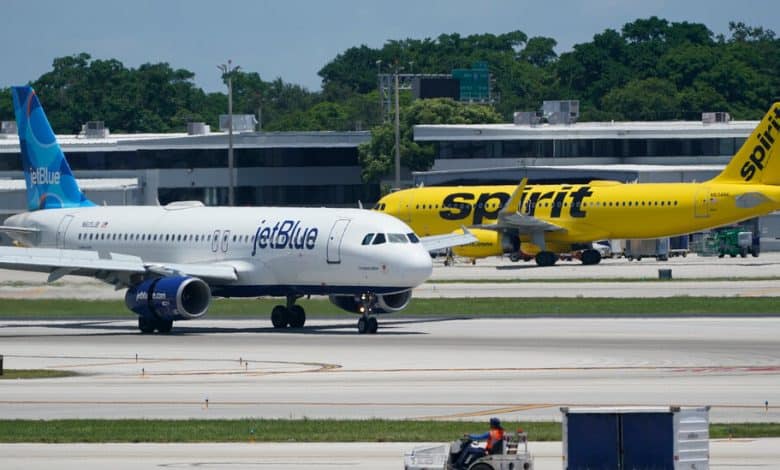Judge Blocks JetBlue From Acquiring Spirit Airlines

A federal judge on Tuesday blocked JetBlue Airways’ proposed $3.8 billion acquisition of Spirit Airlines, a victory for the Department of Justice, which argued that the deal would harm travelers.
In his 109-page ruling, Judge William G. Young of the U.S. District Court for the District of Massachusetts sided with the Justice Department in determining that the merger would reduce competition in the airline business.
The proposed merger would have created the nation’s fifth-largest airline. The Justice Department argued that smaller, low-cost airlines like Spirit helped reduce fares and that allowing the company to be acquired by JetBlue, which tends to charge higher prices than Spirit, would have hurt consumers.
The four largest U.S. airlines — American Airlines, Delta Air Lines, Southwest Airlines and United Airlines — control about two-thirds of the market. The merger would have given JetBlue a market share of 10 percent, still shy of United, the fourth-largest U.S. airline, which has 16 percent.
Lawyers for JetBlue argued in court last month that the merger would allow it to better compete with the four large national airlines, bringing prices down overall. The Justice Department argued that a larger JetBlue would act just like its bigger competitors while taking away a low-cost option for travelers.
Analysis presented at trial showed that when Spirit introduces a new route, fares, including those on JetBlue flights, come down. JetBlue planned to reconfigure tightly packed Spirit airplanes to match its own roomier layout, meaning it would reduce the number of seats.
Judge Young agreed with the government, ruling on Tuesday that the merger would “likely incentivize JetBlue further to abandon its roots as a maverick, low-cost carrier.” He said Spirit played an important role in the market as a small, low-cost alternative to large airlines.
“Spirit is a small airline,” he said in the ruling. “But there are those who love it. To those dedicated customers of Spirit, this one’s for you.”
President Biden hailed the ruling as a win for consumers in a post on the social media site X and said that his administration would aggressively enforce antitrust laws. “Capitalism without competition isn’t capitalism — it’s exploitation,” he said. “Today’s ruling is a victory for consumers everywhere who want lower prices and more choices.”
Spirit’s share price tumbled 47 percent by Tuesday afternoon following the news, while JetBlue’s share price closed up 5 percent.
Jonnathan Handshoe, an airline analyst for CFRA Research, said JetBlue shares had risen because the rejected merger represented a $3 billion cost-saving measure for the company. Spirit’s shares fell in part because the proposed merger would have been a lifeline to the company, which had been struggling with operational issues and had not turned a profit since before the pandemic.
During the pandemic, many domestic airlines took on a mountain of debt “because they were trying to replace older aircrafts with much newer ones,” Mr. Handshoe said.
As part of the merger agreement, JetBlue agreed to pay Spirit $70 million and its shareholders $400 million if the deal was blocked. In a joint statement on Tuesday, the airlines said they disagreed with the ruling and were evaluating their options.
“We continue to believe that our combination is the best opportunity to increase much-needed competition and choice by bringing low fares and great service to more customers in more markets while enhancing our ability to compete with the dominant U.S. carriers,” the companies said.
The ruling comes just weeks after Alaska Airlines announced plans to acquire Hawaiian Airlines for $1.9 billion. If approved, that deal would give Alaska about 8 percent of the airline market.
In May, a federal judge blocked a partnership between JetBlue and American in Boston and New York after it was challenged by the Justice Department, which argued it dampened competition for flights in the northeast. The ruling on Tuesday creates a “winning streak” for antitrust officials, said Dylan Carson, a lawyer at the firm Manatt, Phelps & Phillips.
“It really helps put the wind in the sails of the Biden administration’s enforcement agenda,” said Mr. Carson, a former antitrust trial lawyer at the Justice Department.
Hubert Horan, an aviation consultant, said the proposed merger would have eroded competition in the airline industry. Low-cost carriers like Spirit, rather than the four larger companies, had “driven most of the industry’s operating and marketing innovations,” he said.
“Instead of aggressively competing, JetBlue has been morphing into a smaller version of a legacy carrier,” Mr. Horan said.
Niraj Chokshi contributed reporting.